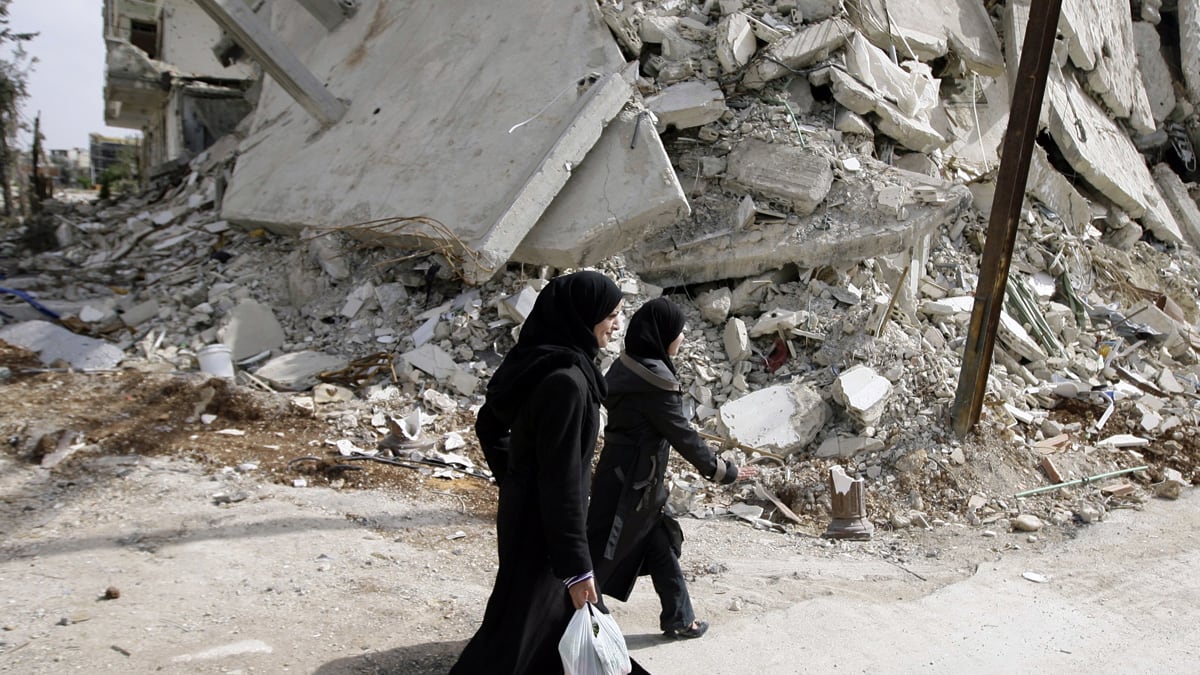She speaks haltingly. Telling the story isn’t easy for the 38-year-old Syrian Sunni Muslim, and she won’t be explicit about the physical details that suggest her friend had been raped before dying. Coaxed by her husband, and with her 4-year-old daughter fidgeting by her side, Saima talks quietly of the slaughter of her husband’s first wife, of her own near-death, and of the rape of a friend in their hometown of Homs in west Syria.

Her story adds to mounting allegations that Syrian forces—most especially the pro-government Shabiha civilian militia, the ultraloyal enforcers of embattled President Bashar al-Assad’s regime—are using sexual violence and rape to terrify and punish rebels, adding to the cruelty of an 18-month-long conflict that has seen the government shoot unarmed civilians, including children, and shell populated areas, and has seen the rebels torture and execute captured Shabiha militiamen.
“Syrian government forces have used sexual violence to torture men, women, and boys,” says Sarah Leah Whitson, Middle East director at Human Rights Watch. “Soldiers and pro-government armed militias have sexually abused women and girls as young as 12 during home raids and military sweeps of residential areas.”
The stigma of sexual assault runs deep in Syrian culture as it does across the Middle East; rape is shaming and casts dishonor, and it is especially difficult for Salma to speak of such things with a male stranger, making her testimony that much more significant and plausible. Dressed in black, her head covered by a hijab, Saima displays her scarred hand. She’d raised it instinctively as bullets were flying to shield her daughter when the Shabiha stormed their home and started shooting randomly.
In a house just north of the city of Aleppo where the family has taken refuge, Saima grimaces as she recalls Feb. 11, the day that regular Syrian Army soldiers had come to their pro-rebel neighborhood in Homs. The soldiers searched the houses, smashing furniture and beating the men with rifle butts. That was merely a prelude for the raid an hour later when the Shabiha arrived.
Drawn mostly from Syria’s minority Alawite sect, the thuggish militia has been blamed for many of the worst excesses in the conflict. “I recognized some of them. They were from Alawi districts nearby. They were our neighbors, too,” she says, shaking her head in disbelief. “I was sitting with my ‘sister-wife’ and a friend and our children. The Shabiha ordered us to stand, screamed at us and started to fire wildly.” The assault left the sister-wife dead, as well as all of her four young children. Saima survived along with her own three children (who range from 4 to 10 years old) thanks in part to a militiaman who was sent back to kill them, but who instead rattled off rounds harmlessly into the ceiling.
That evening when the Shabiha had moved on, she saw her 26-year-old pregnant neighbor on the street outside. She was dead. “She was naked and had been raped,” Saima says firmly. Saima names the dead neighbor but declines a family name. “It wouldn’t be right, I don’t know what her family would want, they might not accept it,” she pleads. Her husband immediately stresses that their own family name can’t be used either—he fears reprisal, if the rebellion against President Assad should fail.
How did she know her neighbor had been raped? Saima shudders, replying, “It was obvious,” gesturing weakly toward her groin. She doesn’t want to be explicit. She says she doesn’t think her friend was the only woman raped and killed that day. “They raped teenage girls,” she says almost in a whisper, claiming that the next day, she saw naked girls in the hospital piled up, dead and bearing obvious signs of sexual abuse.
Last month, the human-rights group Women Under Siege said it had documented 81 instances of sexual assault in Syria since March 2011, with 90 percent of the women assaulted suffering rape and 42 percent being gang-raped. Nearly a quarter had been killed after being raped. Most of the attacks the group recorded occurred in pro-rebel Homs, where the government’s brutal suppression of anti-government protests triggered the rebellion. But rape allegations are more widespread and have been heard in other towns and cities across Syria, including Aleppo, where Free Syrian Army rebel forces have been locked in a savage fight with government forces for control of Syria’s second largest city.
For human-rights organizations, rape allegations during a bitter conflict always pose a challenge. Combatants—from rebels to governments—often accuse opponents of rape, seeking to demonize their adversaries and gain a propaganda edge. Assessing rape allegations gets even more challenging in the Middle East, where women won’t come forward because of the dishonor it brings to their families. They suffer in silence, handling the trauma of rape alone. Human-rights workers are still trying to understand the scale of rape as a weapon of war during the Libyan conflict that saw Col. Muammar Gaddafi toppled last year. Sorting out fact from fiction, working out how many women—and men—suffered sexual violence and whether the rapes were systematic and ordered by the Gaddafi regime bosses, or were more opportunistic and spur-of-the-moment, is proving challenging there.
In Libya, too, rebels were eager to “cry rape” when it served their propaganda purposes but denied vehemently any rebels were involved in sexual violence—something Libyan women activists say happened, although to a lesser degree. As in Libya, investigators in Syria are likely to have to rely on the evidence coming from rapists themselves or from their fellow combatants who refused to abuse. Or they will have to base their assessment on the testimony of medical staff to understand the scale and nature of the sexual violence in Syria.
“In this region this is one of the most difficult crimes to document,” says Anna Neistat of Human Rights Watch. “So it is possible that cases that come to our attention are just a tip of the iceberg. We are also being very careful when documenting rape allegations, especially the ones coming from third parties rather than victims themselves or medical professionals who treated them.”
The watchdog group is investigating allegations currently of at least two cases of rape in Aleppo, which resulted in pregnancies and the evacuation of the women to Turkey. The group has currently documented another 20 incidents of sexual violence.
Army defectors claim that officers encourage rape. Mohamed, a 23-year-old who served in the Syrian Army in a special forces unit as a sergeant, says he decided to join the rebellion several months ago after being ordered to rape teenage girls in Homs at the end of last year. “Some of my friends who refused to rape were shot,” he says. “I managed to disobey, and fortunately the officers got distracted,” he adds.
“The officers were mostly Alawite, and they would target the houses of [opposition] activists in Homs and gather the younger girls and rape them. After they’d finished they’d tell the soldiers outside to come in and rape the girls, too. The girls would generally be shot when everyone had finished. They wanted it to be known in the neighborhoods that the girls had been raped, but they didn’t want the girls to survive and be able to identify them later.”
The scale of sexual violence in Syria—and whether it is being done systematically under the direction of government superiors—remains unclear and will be for some time. Nonetheless, the allegations are too persistent and widespread to dismiss, and they are adding to a seething fury on the rebel side, justifying, as far as many rebels are concerned, brutal treatment of Army soldiers and Shabiha who fall into their hands. Sexual violence will also likely make reconciliation between the Sunni majority and their minority Alawite neighbors that much harder to pull off in the future. Asked whether he could live close to Alawites again, Saima’s husband doesn’t hesitate to say no. “How can I? How can anyone ask me to live with Alawites again?”






